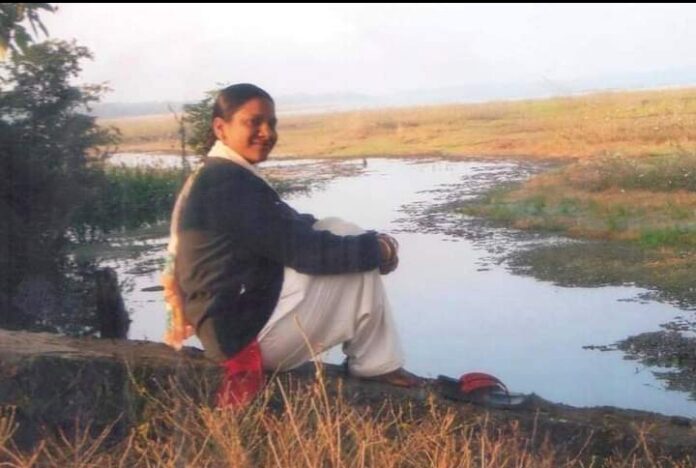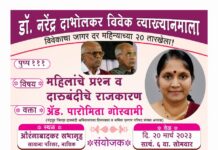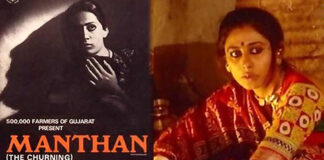
Shahnaz Baig, India’s first woman forest guide, Mohurli, Chandrapur
Women are the change makers in the society. They have to overcome the barriers to reach opportunities. The question arises whether they are able to enjoy the fruits of such hard-earned opportunities. Well here are the stories of three young women – one Muslim and two Adivasis (Tribal), from the District Chandrapur, Maharashtra.
Till 2012, the job of forest guides for tourists in the Tadoba Andhari Tiger Reserve (TATR) was restricted only to men. Neither were women called for the job, nor were they considered fit for it. In 2012 Shehnaz Baig, a resident of Mohurli Village, Dist. Chandrapur (Maharashtra) raised her voice against this discrimination and a local organisation Shramik Elgar supported her in this cause. They had to fought tooth and nail against the opposition of the village men as well as forest department officials to get the women’s acceptance as forest guides. Ultimately, Shehnaz Baig and Shramik Elgar won the battle. In the year 2015, Shehnaz Baig became the first lady Forest Safari Tourist Guide in India. She along with five other women of Mohurli were inducted as guides by the forest department. Indeed she had stormed the patriarchal man’s Bastille.
Things changed in the last five years. There were many tourists especially women and families who started to prefer lady guides and because of this the forest department too became open to inducting women as guides. Recently in 2022 the forest department officials went to villages in the buffer zone and organised meetings asking women to join as guides. In Khutwanda gate two women agreed to become part of the team of eight to undergo the training. These two were Niranjana Urkande and Sangeeta Zade.
However, the problem arose when the village men who were already working as tourist guides refused to allow the new team to join work. Out of the eight, the six men were not allowed any work at all, whereas the two women were allowed to work on an irregular basis.
Now the women are asking that why they should not be allotted regular job even though they were appointed by the forest department itself. When men have regular rounds, why women guides are discriminated? They are not ready to accept that the older guides have the right to stop them when or give them less work. Their contention is that if they give up then no other woman from their village will come forward in the future.
Right to Equality as enshrined in the Indian Constitution, ensures that people are given equal opportunities and equal pay for similar nature of work. It creates a conducive environment for the women to express her capabilities fully. Gender disparity is so apparent on ground that many jobs are reserved only for men.
As held by the Supreme Court in its recent judgment in the case of Union of India &Ors Vs Lt Cdr Annie Nagaraja & Ors (2020):
“The battle for gender equality is about confronting the battles of the mind. History is replete with examples where women have been denied their just entitlements under law and the right to fair and equal treatment in the workplace. … A level playing field ensures that women have the opportunity to overcome their histories of discrimination with the shortest of responses based on their competence, ability and performance.”
The paradox of Identities are reminiscent in a character of English playwright William Shakespeare’s play ‘The Merchant of Venice’. The Character of Portia.
Portia displays fierce autonomy and an astonishing sense of self, yet she had to don a cloak of masculinity in order to speak in a courtroom in order to be taken seriously, as the Venetian court system during that time did not allow female lawyers.
Why is it that Men get several safari rounds daily, while women get only one round in two days?
Ms. Niranjana Urkande, a resident of GhosariVillage, Takula Bhadrawati, District Chandrapur.
An Adivasi woman who served as a Sarpanch of her village Wadala (a Gat-Gram Panchayat) for 2015 to 2020. She is young and a dynamic lady with great zeal to work. Ms. Niranjana said, in the beginning of this year (2022) there was an advertisement displayed in her Gat-Gram Panchayat that there is a recruitment drive for Men and Women Tourist Guides. She motivated the women of her village to apply for this post. However, the men and women of her village denied in the pretext that this job belongs to men and women should not try for such an adventure. So, she decided to apply for herself. Ultimately she was appointed by the Forest Department as a lady Tourist Guide for Khutwanda Gate of TadobaAndhari Tiger Reserve. She is a fearless lady who instead of fearing the Tigers’ and other animals of the Jungle, she calls the forest and the animals in it as her family. She loves this job as a Tourist Guide.
She does not ask for higher payment, nor she wants special treatment being a woman. She is demanding for her rights as a guide. When Men Guides are given 1 to 2 rounds daily, she is demanding at least 1 round Safari each day, which is also her job profile. However the older male guides and the forest department are yet to consider the demand.
Sangeeta Zade, an Adivasi woman posted as the Lady Tourist Guide at Core (Buffer Zone) of Khutwanda gate, TadobaAndhari Tiger Reserve.
She is married to Anand Zade. She is the sole bread-winner of her family. Her husband is jobless, so now has the responsibility to look after her family. She said there is no job I cannot do, I have to look after my family. Due to the remoteness of her village, she hardly has access to urban employment. So she work on agriculture field on daily wage of Rs. 200/-.
An Adivasi woman living in a remote village with bare minimum needs and opportunities, with just 2 rooms in a hut, is not asking for any wealth. She just want to ensure two square meal for her and her husband.
Among eight people, she was also appointed as a Tourist Guide. However, she gets Safari rounds once in two days, that means 12 to 13 Safaris in a month. Where the older male guides get several safaris daily, the two women tourist guides duly appointed as per law, are devoid of their legal rights.
Their contention is if there are lack of vehicles for the Safari, instead of curtailing their rounds (Safari) there is a request to the forest department to increase the number of vehicles. According to these ladies, the number of visitors has also increased. The Government seek a solution to ensure the women get equal access to employment.
The women in India are most marginalised and oppressed as they are prone to discrimination in all walks of life. The intensity of the oppression and discrimination intensifies for Adivasi Women. It is with better opportunities for Education and Employment that they can be uplifted. We cannot doubt the pious intention of the Government for drafting the progressive policies for them. However, it is the implementation that creates a doubt on the Government’s intension. The laws in India failed to accommodate and protect the Human Rights of the Adivasi Women. Non-availability of social benefits, lack of proper representation, Discriminatory Policies and failure in Grievance Redressal makes their life difficult in Modern India even at the 75th Year of Independence.
It is the responsibility of the concerned Government and the appropriate authorities to listen to the grievance, redress them in a timely fashion and make sure that the voices of tribal are heard and issues are taken seriously. The government Institutions responsible for the protection and upliftment of the Adivasis including the Ministry of Tribal Affairs, is responsible towards protecting their Human, Legal and Constitutional Rights.
– Preetisha Sadhana
Chandrapur









